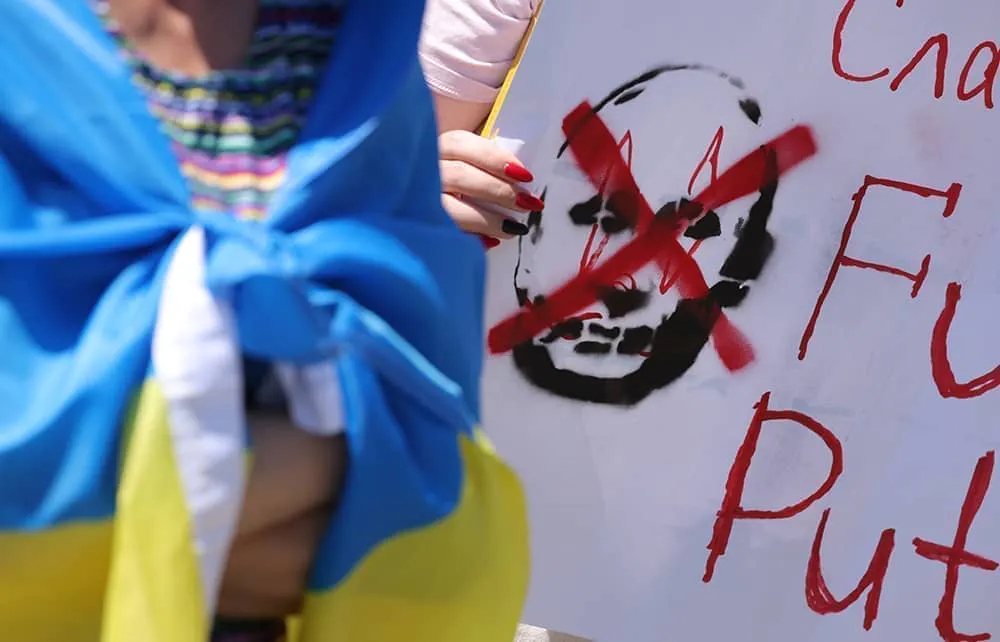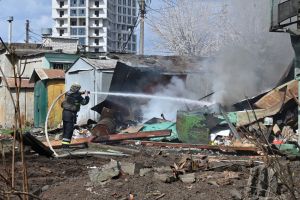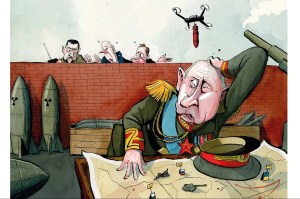Not every critic of Vladimir Putin ends up in jail. It still suits Russia’s president to present his country as a democracy. Elections are occasionally held against opponents whom Putin goes on to defeat, so enemies are often tolerated if they don’t pose a serious threat. Last week, seventy local councillors from across Russia used this remaining freedom to sign a petition calling for his resignation.
Their protest started with a letter from councillors in St. Petersburg which called for Putin to be indicted on charges of treason and removed from office. A petition followed. I spoke to a few of the signatories and found them surprisingly willing to discuss their reasoning with me. They don’t expect to overpower Putin and they know they risk being jailed. But they offer an interesting picture of opposition to Putin’s war. “Yes we are being put under pressure,” says Dmitry Baltrukov, a member of St. Petersburg’s Smolninskoye council. “But staying silent isn’t an option.”
The council then voted to send the letter to the State Duma in Moscow. It was a huge risk, but the natural next step of protest. Some members of the council have already been summoned by local police, accused of “actions aimed at discrediting the Russian government.” Clearly there are limits to how much opposition Putin is prepared to tolerate.
But as casualties in Ukraine mount, that opposition is growing. “A bunch of young, capable people will die in this war or become disabled,” says Dmitry Palyuga, thirty-five. “This war is a catastrophe for the Russian Federation.” Besides crippling the country’s economy, the war will devastate Russian society. “Those who return will somehow have to continue their lives here in peacetime — it will be difficult. Previous wars have shown us we will once again have a ‘lost generation’ who will be really difficult to integrate back into civilian society.”
Both Baltrukov and Palyuga have paid the price for a higher profile. They were each fined just under $800 for discrediting the authorities — but risked being jailed for up to fifteen years. “We want to show solidarity because of the intimidation they’re facing,” said Ksenia Thorstrom, another St. Petersburg councillor who signed the petition. “We want to show we’re not scared. But of course we are.” Olga Fattush, fifty-seven, a councillor for the Gavan municipal district in St. Petersburg, was born in Ukraine and has family there. “How could I not sign this letter? The culprit for everything we are going through is Putin; he is the one who has done this. He has destroyed family ties. I am not the only one with this pain. There are thousands like me.”
The petitioners fear Putin is turning the clock back on Russia’s progress. A new iron curtain seems to be descending. “You can split life into before and after February 24, anyone here will tell you that,” says Timofei Nikolaev, another petitioner from Moscow, his voice faltering with emotion. “It’s hard.” Censorship has returned, as has the re-emergence of thought crime.
Anna Kisileva, another Smolninskoye councillor, says: “Everyone is waiting for this to end somehow. But there must be change of some sort… Many of my friends have left the country for political or practical reasons. They don’t see a future. Russia is full of talented, worthy people. We need to somehow improve our situation and rejoin the civilized world. Life in isolation is impossible.”
But for Russians to admit their doubts even to each other is to take a risk, says Baltrukov. “Self-censorship exists everywhere. People are scared to discuss things and remember the repressions of the Soviet Union. That’s why it’s difficult to know what other people think. People don’t want to post things on social media either.” He acknowledges that what follows Putin could be worse. “This will also be a very difficult moment for Russia,” he says. “Some people do support the idea of a Russky Mir [a ‘Greater Russia’ that includes Ukraine] but don’t support Putin because of his direction. Someone could come to power who will be very pro-war, and not stop until we have victory. In 1917 the Bolsheviks were a tiny marginal party, but they were the most ruthless and seized power. We don’t want a repeat of that.”
This article was originally published in The Spectator’s UK magazine. Subscribe to the World edition here.


















